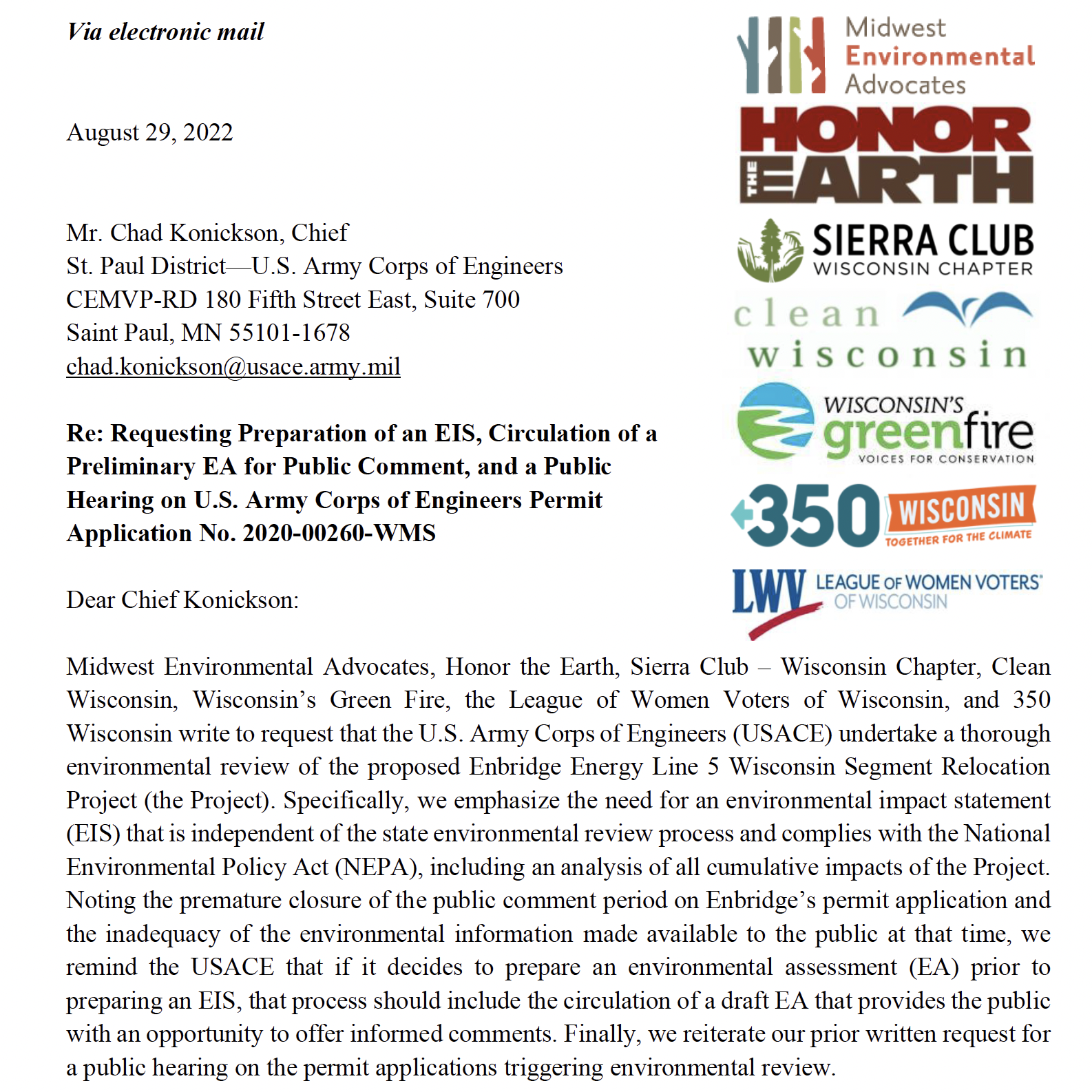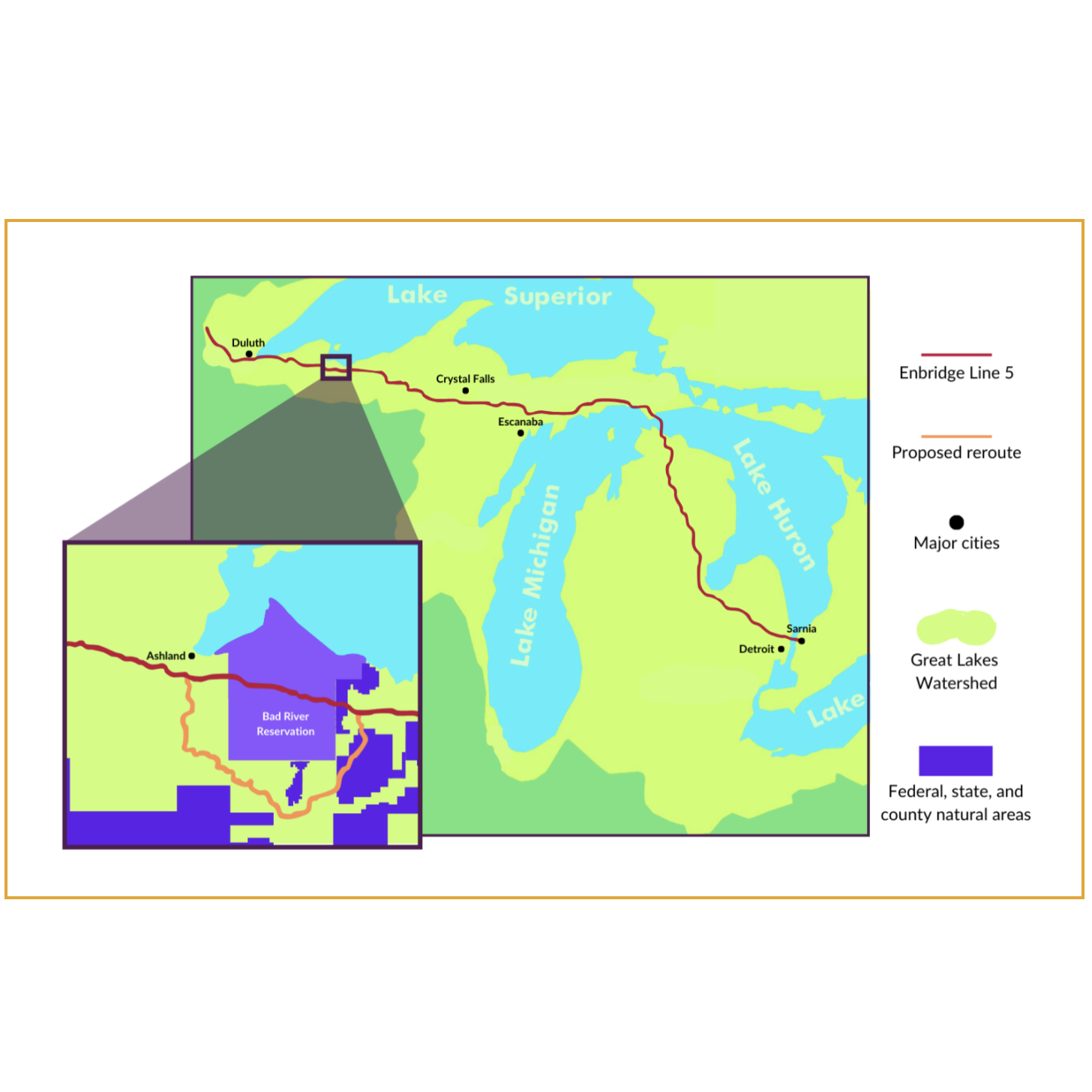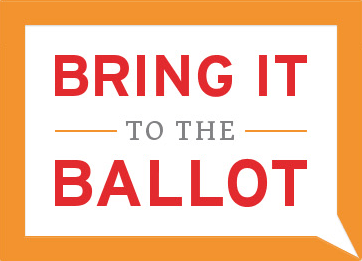Natural Resources Advocacy
The League of Women Voters of Ashland & Bayfield Counties takes positions on and advocates for key public policy issues after intensive study, debate and consensus by our membership. A description of this stringent process is outlined in Our Mission.
The LWV/ABC acts in support of League of Women Voters of Wisconsin Positions on Government, Natural Resources, and Social Policy. The League of Women Voters of Wisconsin Education Network Inc. lobbies for positions in the current legislative session and also files lawsuits in support of stands—see the LWV WI website for information on their Wisconsin Voter ID Lawsuits. The LWV/ABC also acts in support of National League of Women Voters Positions.
We welcome your participation in our efforts! Use this page find information, positions and action on Pipelines, Water & Air.
Natural Resources Latest News
Have you been wondering what all the concern is about Enbridge Line 5? You are not alone!! For further information about this pipeline, and to “come up to speed,” please check out RetireLine5.org. Packed full of facts from both Michigan and Wisconsin!
Latest News on Enbridge Line 5
Enbridge Line 5 Pipeline Resolution
“It is my honor to share with you the Resolution carefully crafted by our Natural Resources Committee and approved by the Board of the League of Women Voters of Ashland and Bayfield Counties on November 26, 2019.
This Resolution will support and inspire important action to protect the land, water, and all species that inhabit our precious and bountiful part of the world.”
Approved by the Board of LWV/ABC on November 26, 2019
WHEREAS the League of Women Voters of Ashland and Bayfield Counties (League) supports measures to prevent water pollution, including measures to protect lakes, streams, and wetlands, and protection of current and potential drinking water sources;
AND WHEREAS the league recognizes the Sovereignty of Native Americans, including the Bad River Band of Lake Superior Tribe of Chippewa Indians, and respects treaty rights in regard to water resources, as well as their positions and decisions with respect thereto;
AND WHEREAS the League supports the efforts of Towns and Counties to protect their citizens from the adverse impacts of environmentally destructive activities;
AND WHEREAS the League understands the need for and supports a timely and rapid transition to renewable energy;
AND WHEREAS the League supports the preservation of the physical, chemical, and biological integrity of the ecosystem and maximum protection of public health and the environment, and further supports the stewardship of land as a finite resource, particularly fragile lands and waters, such as the Bad River Watershed, Lake Superior, and the Straits of Mackinac, where leaks and spills from oil pipelines could result in irreversible damage;
AND WHEREAS Enbridge Energy has proposed the continuance, replacement, and/or relocation of a pipeline to carry oil through northern Wisconsin and Upper Michigan;
AND WHEREAS Wisconsin as a whole derives minimal benefit and has no utilization of product of Enbridge line 5, but assumes great risks associated therewith;
AND WHEREAS the League acknowledges the Bad River watershed's unique, remote, and challenging terrain that, when combined with the increasing frequency of extreme weather events, has proven hazardous to pipeline integrity;
AND WHEREAS Enbridge pipelines have, in the past, and continue to, experience numerous leaks and spills, which have resulted in the discharge of massive quantities of oil and other pollutants;
AND WHEREAS Enbridge is not required to publicly disclose what hazardous materials are transported by Line 5, contrary to the public's right to know, leaving the public inadequately informed about health and environmental risks;
AND WHEREAS the league fears that Enbridge may have inadequate emergency response plans and we fear Enbridge may provide insufficient funds for any future spill response and clean-up, should they become necessary, and any spill would therefore be environmentally, culturally and economically catastrophic;
AND WHEREAS the League is a member of the League of Women Voters Lake Michigan Region, and Enbridge Line 5 proceeds to route through the Straits of Mackinac where it puts both Lakes Huron and Michigan at risk;
NOW, THEREFORE, the League of Women Voters of Ashland and Bayfield Counties, Wisconsin, passes this resolution to express their OPPOSITION to Enbridge Line 5 and their SUPPORT for the efforts of the Bad River Band of Lake Superior Tribe of Chippewa Indians and others, including private landowners along the (current and proposed) Enbridge Line 5 corridor, to halt any expansion or relocation of the line and rather to see it removed from the Bad River watershed and decommissioned entirely.
Dated this 26th day of November, 2019
Anne Chartier, President
League of Women Voters of Ashland and Bayfield Counties
Additional LWVABC Documents
Regarding Enbridge Lines 3 & 5
Letter to Minnesota Pollution Control Agency Re Enbridge Line 3 04092020
Letter to Army Corps of Engineers Re Enbridge Proposed Tunnel Under the Straits of Mackinac 06242020
Letter for Public Hearing Re Enbridge Proposed Tunnel Under the Straits of Mackinac 12142020
LWV/ABC's Position on Water
Our Position on Water has been accepted at the state level. Our thanks go out to the LWV/ABC members and Board who worked to formulate amendments to the LWV WI Water Position.
This issue is of special concern to LWV/ABC because of the threat the proposed taconite mine in the Penokee Hills presents to the waters of Lake Superior and the surrounding region. The changes presented by LWV/ABC at the annual LWV WI meeting addressed mining discharge, local water quality testing, monitoring the transportation of polluting materials, respect for tribal sovereignty, and prevention of aquatic invasive species.
Our current fortified water position provides us with a stage for vigorous advocacy. The LWV WI has authorized a Water Education Campaign to increase understanding and to educate the public on emerging issues relating to the Water Position.
The LWV WI and LWV/ABC will advocate for the strongest possible water protection and restoration actions. Water is necessary for life. The League must look beyond current inadequate public policy and make a clear statement consistent with League values: We envision an informed citizenry participating in public policy to ensure equity for this and future generations
POSITION ON WATER
Adopted by delegates at state Annual Meeting, May 31, 2014
Maintaining access to clean water which supports life and a healthy environment is a public trust, a fundamental human right, and is the shared responsibility of all who live or do business in Wisconsin. Managing water as a natural resource is essential to maintaining our quality of life and the strength of our economy, as well as to ensuring its availability to support the mix of natural flora and fauna which is unique to our state. Decisions about water use and management must be made with consideration for public safety and the impact those decisions will have on all current and future generations of stakeholders.
Water quality and quantity standards need to be addressed in terms of whole basin management and the hydrologic cycle. That is, management not just of the water itself, but of the land and watersheds which drain to wetlands, aquifer, meteoric groundwater, river, lake or other body of water, whether it is naturally occurring or constructed, and wherever it is located. Water management is therefore accomplished as management of all parts of an integrated system within basin boundaries and of any water which may move into or out of that system.
We hold a vision of life where prudent management of water resources leads to sustainable use, where consumption does not exceed the environment’s ability to replenish and to protect itself, and where its quality and quantity is such that all native aquatic species and other water dependent wildlife thrive. All current and future generations of stakeholders in Wisconsin shall enjoy the benefits of equal access to natural sources of clean, fresh water.
We support:
Reaffirming the Great Lakes Compact (Wis Stat 281.344-346), which strictly limits unnatural diversions of water from within the Great Lakes Basin. The Great Lakes Compact provides guidelines for mandatory standards of water conservation and efficient water management within the Great Lakes Basin. We support extending these mandatory standards to all waters of the State to prevent ground and surface water depletion.
Water conservation programs that:
1. Are based on best practices and sound data
2. Prevent depletion of our water resources
3. Take into account cumulative impacts of local and regional water use.
4. Prevent the spread of aquatic invasive species.
Ongoing testing and monitoring for water quality and quantity on state and local levels.
State, local and citizen legal authority to set and enforce their water quality and water management standards.
Respect for Tribal sovereignty and treaty rights in regard to water resources.
Protecting water quality and quantity through wastewater and stormwater standards and management for both point and non-point sources.
1. Adjust cumulative discharge standards for waste and storm water discharges into surface or underground water where effluent levels have been proven toxic.
a. Acknowledge that cumulative discharge may come from a combination of sources which include, but are not limited to agricultural, mining and forestry, industrial, commercial, municipal, residential and institutional. (“Agriculture” is understood to be broadly defined to include any agricultural practices including current or emerging technologies.)
b. Utilize sustainable practices and green infrastructure that mimic natural hydrologic processes to augment natural processes to control runoff.
2. Work to eliminate all emergency discharges or spills of untreated sewage, or waste or polluting materials into the environment that threaten public health and the environment by potentially contaminating sources of clean water for humans, wildlife habitat and fisheries.
a. Increase and enforce per incidence fines offending parties are assessed and create fines and funds to restore the negatively impacted environment.
b. Decrease stormwater loadings that negatively impact the capacity of wastewater treatment facilities, decreasing the potential for overflows.
c. Monitor the transport of polluting materials both overland, over waterways and in underground pipelines.
3. Provide natural areas where runoff from impermeable surfaces and extreme precipitation events can soak into the soil instead of being released directly into bodies of water or directly into wetlands:
a. Promotes replenishment of the hydrologic cycle as well as harvesting of rainwater for immediate uses (such as drinking water, irrigation, and livestock).
b. Prevents the loss of limited sources of drinking water by allowing fresh water to follow its natural course of eventually flowing to the ocean.
c. Prevents trash, bacteria, phosphorus, heavy metals, pharmaceuticals and other pollutants from unrestricted entry into bodies of water.
4. Protect and enhance the biological integrity of wetlands and other naturally-occurring hydrologic resources that provide water quality, flood protection and habitat benefits.
Sufficient funding for state and federal agencies to monitor water quality and quantity through regular testing, and have a legally defined mandate to act in upholding water standards.
1. Establish dedicated revenue sources to provide a dependable source of funding for state water quality programs.
2. Revenue sources should have a clear and transparent connection to the use or potential abuse of water, generate sufficient funds to make an impact on water quality and quantity issues, and be easy to collect. Funding options should include:
a. General revenue sources because all Wisconsin citizens benefit from adequate water quality and quantity.
b. User fees and taxes assessed to activities that affect water quality and quantity.
c. Other revenue sources not mentioned may be considered for support if they meet these criteria.
Additional LWVABC Documents
Regarding Our Position on Water
Waters of The United States, April 15, 2019
Comments Regarding Docket ID No. EPA-HQ-OW-2018-0149
Letter to Army Corps of Engineers Re Enbridge Proposed Tunnel Under the Straits of Mackinac 06242020































